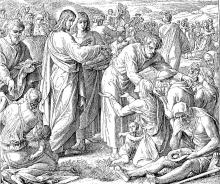The Evansons were out of our league. We were a plain old missionary family coming from rural New Hamburg, Ont., and they were über-educated university professors from glamorous Colorado, U.S.A. But as she so often did when newcomers arrived in Brazil, my mom took the Evansons under her wing. She picked them up at the airport and then helped them find a place to live, furniture, schools for the kids, and so on.
As a 15-year-old, I didn’t worry much about what Mom was up to all day. It was what she did at supper that day that was mortifying. She invited the Evansons to our house to eat with us. It was obvious that she hadn’t planned to have visitors. Her menu for that evening was one of the plainest meals in her repertoire, straight from her humble life on the farm: bean soup and apple pie. Just picture it: white beans and chunks of white bread floating in a milk base. Then just before we ate it, we’d sprinkle cinnamon on top—one last weird culinary touch. It was a good soup, but to the uninitiated it lacked visual appeal. It’s a soup you’d think twice about setting in front of your family, to say nothing of serving it to important visitors.
But my mom—whose name was Grace—didn’t care about appearances. Her humble menu did not limit her hospitality, because it wasn’t about food. It was about welcome. She improvised: put a little more milk in, broke up some more bread, cut the pie into smaller portions, and voilà!—enough for a crowd! Her table boasted no place settings, no centrepieces, not even a soup tureen. Martha Stewart would not have approved. We said a prayer—how embarrassing—and then the university professors with their three kids crowded around the table with our lowly missionary family and ate that soup like it was a feast.
About 30 years later, when Mom died, the Evansons sent a lovely condolence card. Do you know what they remembered best? That anemic-looking soup. When they were strangers, Mom’s way of treating them like family made a lasting impression on them. You just never know what will happen when you open up to strangers, when you eat with them and include them in community.
An example of hospitality from Scripture
I wonder what people remembered about that day when Jesus fed an army of people outside Bethsaida. It was definitely memorable: all four gospels include the story, including Luke 9:10-17. The event was also influential in early Christianity. The way it is written—telling how Jesus took the bread, blessed it and broke it—ties the story to the liturgy of the Lord’s Supper. To this day when we get together to be church, we gather around a simple shared meal in which bread is broken and blessed in Jesus’ name.
There is a lot happening in this story, but what I particularly see is Jesus demonstrating the true nature of hospitality. Hospitality is welcoming strangers. It is often unplanned and unpredictable, it comes from an attitude of open invitation, it often includes food, and it is an abundant blessing to all involved.
As Luke tells it, Jesus had only recently sent out his disciples on a mission trip to proclaim the kingdom of God and to heal. The disciples weren’t supposed to take along any provisions, but instead were to count on whatever hospitality they found along the way, staying in people’s homes and moving from place to place. They did just that, and they came back on sort of a high, wanting to debrief. So they picked up and went away from the crowds to tell Jesus all about their ministry, without interruptions.
But their retreat didn’t go as planned. The crowds followed Jesus and interrupted the meeting. The debriefing had to give way to teaching and healing. Before they knew it, it was time for supper. They were out in the middle of nowhere, the sun was going down, and a lot of people were still milling around. Jesus’ training seems to have had an effect, and the disciples showed some sensitivity to people’s needs. They were probably also remembering all the times strangers had offered them food in the recent past, so they saw it as their responsibility to make sure these people were fed.
They really wanted to practise hospitality. The problem was, they put their heads together to try to figure out what to do, and they came up with nothing. Well, almost nothing. Somebody scrounged up a couple of fish and some bread, but that wouldn’t do much good. They just were not in a position to feed anyone, let alone a crowd. So they explained the problem to Jesus and asked him if he would kindly dismiss everyone.
But it was not in Jesus’ nature to send people away. Maybe he sensed an opportunity to turn a crowd into a community, a chance to live out God’s idea of abundance and hospitality. You can feed them, he said. But the disciples still couldn’t see a solution that didn’t involve a monetary transaction. They didn’t have any money, so obviously the people would need to go to town and use their own. The disciples were stuck in their reliance on material resources, not having yet learned all they needed to know about God’s economy.
Then Jesus proceeded to show how to welcome and feed people you don’t know, people who have interrupted your plans with their needs, people who aren’t going away. You start with what you have. You take it, bless it, break it—and then watch God work.
The people were grouped as equals sharing a meal. Strangers became neighbours in this kingdom way of doing things. I imagine scattered groups of people. Some are sitting by the olive grove watching the sun go down. Some are gathered around that woman who keeps following Jesus ever since he healed her. Others are down by the stream washing up. Still others are perched on rocks, dangling their feet and watching volunteers moving back and forth between the groups, giving out food. Everyone is visiting, discussing what Jesus meant about the kingdom of God, reliving the details of the healings they witnessed or experienced.
People came away from that experience changed. They kept retelling the story. They kept replicating it. It became a ritual, a tradition, a way of reminding themselves: “So this is the power of eating together, of sharing resources, of trusting God, of living a life of welcome.”
Hospitality is part of our identity
My mother almost instinctively welcomed people into her home and her circle of friendship. On her retirement from the mission field, her guest book listed more than 3,000 entries—and she would continue to host guests for another 15 years. Hospitality was her special gift, but being hospitable was also in her nature as a Christian.
Maybe we could start to be a more welcoming church by just being more welcoming to people in general. The opportunities are everywhere: slip over so someone can sit beside me on the bench, make room at the cafeteria table for someone who always sits alone, just say hi to someone I don’t know yet.
Maybe we also need to lower our high standards and let God do a little bit of the work, too. A few years ago, Florence joined our congregation in Toronto. She had come from Uganda, and we planned a party for her, to welcome her. I distinctly remember being embarrassed about how few people showed up, like we were doing so little. But it turned out that Florence had never had a party that was just for her. She was overjoyed. She told us that she felt totally loved and welcomed, and she was. God used a party that had struck me as less than perfect to embrace Florence and make her feel that she belonged in our community.
At its heart, as modelled by Jesus, hospitality is about welcoming the stranger, taking even a little bit of our friendship—our food, our listening ears, our helping hands—and entrusting them to God to multiply exponentially. Take, bless, break. Hospitality is taking what we have, no matter how little, and blessing it by presenting it to God, and breaking it to share. It is part of our identity, our nature, as followers of Jesus.
Originally published in a longer version in the Spring 2009 issue of Vision: A Journal for Church and Theology. Used by permission of the author and the publisher (MennoVision.org). All rights reserved.
Michele Rizoli is associate pastor of Toronto United Mennonite Church. Her parents served as missionaries in Brazil for 32 years. This reflection is based on a sermon from Luke 9:10-17 preached at The First Mennonite Church in Vineland, Ont., on Feb. 10, 2008.
For discussion
1. What hospitality have you experienced that was especially memorable? Have you ever served, or been served, the equivalent of simple bean soup, where the fellowship was a particular blessing? Do we worry too much about the appearance of food?
2. Michele Rizoli writes, “Hospitality is welcoming strangers. It is often unplanned and unpredictable, it comes from an attitude of open invitation, it often includes food, and it is an abundant blessing to all involved.” Do you agree? What can we learn about hospitality from Jesus’ feeding of the five thousand?
3. What is it about food that makes it so important in hospitality? Can food ever be a barrier to feeling welcome? Are other cultures better than ours at offering hospitality? Has our modern culture changed our expectations of hospitality?
4. Rizoli suggests, “Maybe we could be a more welcoming church just by being more welcoming to people in general.” What are some ways that we can be more welcoming in our day-to-day lives? Can you think of creative ways for the church to extend hospitality?
—By Barb Draper





Add new comment
Canadian Mennonite invites comments and encourages constructive discussion about our content. Actual full names (first and last) are required. Comments are moderated and may be edited. They will not appear online until approved and will be posted during business hours. Some comments may be reproduced in print.